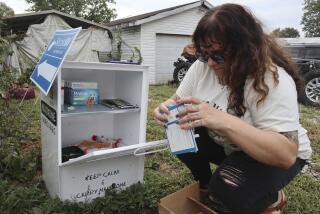COLUMN RIGHT/ TOM BETHELL : Norplant Is Welfare State’s New Opiate : Contraceptive doesn’t address causes of illegitimate births.
- Share via
Recently I visited the Laurence Paquin School, a bleak brick fortress with no ground-floor windows in Baltimore’s inner city. The school has been in the news lately; this month, the contraceptive Norplant will be dispensed free at the school’s clinic. As I arrived, the lunch hour was just ending. Babies were crying softly in the background and teen-age girls were carrying bassinets in the hallway.
The principal, Dr. Rosetta Stith, told me that the entire student body is pregnant, with the exception of those who have already given birth (some twice). They may bring their toddlers to school with them. Each semester, about 300 girls attend the school, almost all of them black.
Norplant consists of six capsules that are inserted under the skin of a woman’s upper arm. The capsules release the hormone progestin, which blocks ovulation for up to five years. With the implant, a teen-ager doesn’t have to worry about forgetting to take the pill. Norplant is considered to be 99% effective.
The students have been well warned that Norplant does not provide protection against viral or venereal disease. When they were asked what does provide such protection, a Paquin class chanted in unison: “Condom, condom, condom.” Was there a hint of derision here? These are teen-agers who obviously have not been using contraceptives with any success. Now, the welfare state is offering them a more foolproof version.
Shortly after Norplant was approved by the FDA, in December, 1990, the Philadelphia Inquirer suggested in an editorial that welfare mothers should be offered “incentives” to use the implant. This was denounced as racist and a “tacit endorsement of slow genocide.” Since then, however, the recommendation has been quietly implemented. Norplant is now covered by Medicaid in all 50 states. In other words, those who are eligible for Medicaid--which is to say, those who are eligible for the main federal welfare program, Aid to Families with Dependent Children--can get Norplant without cost. But the working poor, not eligible for Medicaid, have to pay for it. A private doctor may charge $500 to insert the implant, which itself costs $365.
Since so many welfare recipients in our large cities are black--in Baltimore, the figure is about 86% in a city 60% black--the case can be made that distributing Norplant to those on welfare is an attempt to curtail black fertility. Now, however, there is no longer any outcry about making the contraceptive available. Why?
“The thinking has changed,” Don Kimelman, author of the Inquirer editorial, told me. Changed how? My guess is that quietly, without making any public pronouncements, liberals are becoming frustrated with the inner-city underclass, overwhelmingly black, whose disordered lives are threatening to discredit the whole philosophy of the welfare state. Possibly, with Norplant, we are beginning to see the outline of an anti-natalist response.
My guess also is that it won’t work. The assumption underlying Norplant is that conception among inner-city teen-agers is mostly accidental. Leon Dash questioned this in his 1989 book, “When Children Want Children,” based on months of research in the Washington ghetto. One 16-year-old told him: “Girls out here know all about birth control. There’s too many birth control pills out here. All of them know about it. . . . Girls out here get pregnant because they want to have babies.”
Dash argued that the four pregnant teen-agers in one family he interviewed “wanted children for a variety of reasons--to achieve something tangible, to prove something to their peers, to be considered an adult, to get their mother’s attention and to keep up with an older brother or sister.”
About 500,000 women now use Norplant (up from 100,000 a year ago), but it is not clear yet to what extent welfare clients are using it. Sixty-one percent of sales have been to doctors in private practice. Foundations are also making Norplant available to women not covered by Medicaid. Planned Parenthood of Metropolitan Washington has found teen-agers reluctant to use Norplant because it is more difficult to reverse than other contraceptives and is visible under the skin. “I’ve heard it can give you cancer,” a Paquin student told a New York Times reporter.
One wonders how liberals will respond if Norplant doesn’t affect the illegitimate birth rate (now 66% among all blacks). Perhaps they will recognize that welfare itself sends the destructive message to the underclass that they do not have to be responsible for their lives. Perhaps then, finally, welfare will be drastically reduced. It is the best hope for our inner cities.
More to Read
Sign up for Essential California
The most important California stories and recommendations in your inbox every morning.
You may occasionally receive promotional content from the Los Angeles Times.










